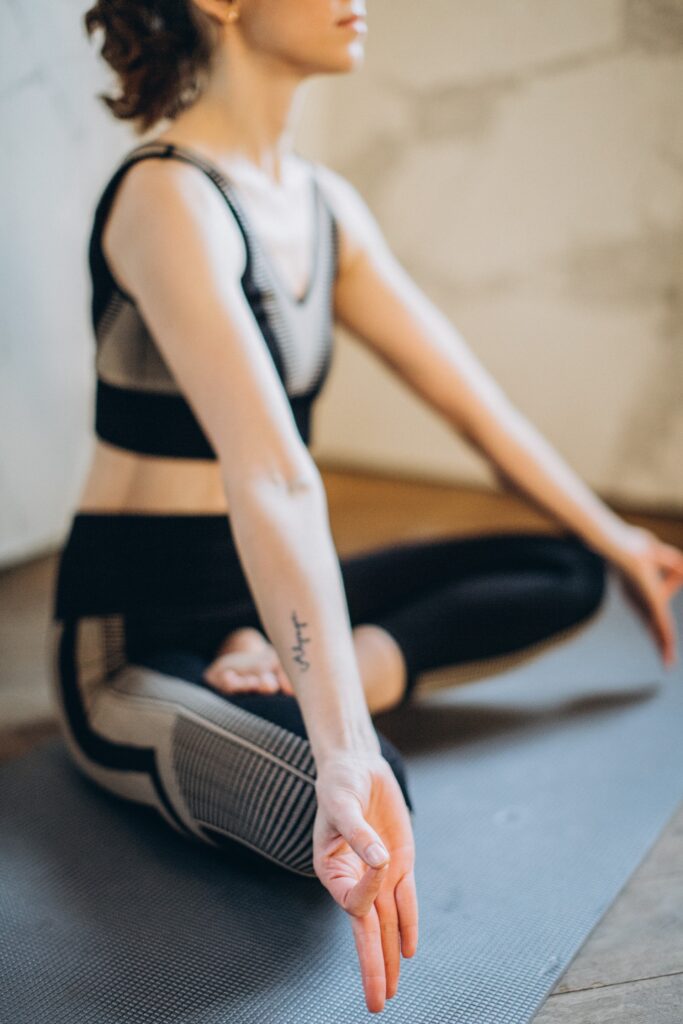Meditation and yoga are two common practices focusing on mental, physical, and spiritual well-being. Though they share some similarities, there are key differences between the two.


Quick Comparison
- Meditation is the practice of focused awareness and attention. The goal is to quiet the mind and achieve inner calm and clarity by tuning out distractions. It typically involves sitting in silence while concentrating on the breath, a mantra, or visualizations.
- Yoga encompasses a variety of physical postures and poses combined with deep breathing. The goal is to promote strength, flexibility, and mindfulness. While yoga can be meditative, it links the mind and body through movement and Flow.
How To Determine If Yoga Is For You
Here are some tips to help determine if yoga is a good fit for you:
– Try a beginner yoga class. Most studios and gyms offer introductory classes that give you a taste of what yoga is like. See how you feel after the class and if it’s something you’d like to continue.
– Consider your fitness level and abilities. Yoga can be practiced at different intensities. If you’re new to exercise, gentle or beginner level classes are a good place to start. If you’re already active, you may enjoy more challenging flows.
– Think about your goals. People practice yoga for different reasons – flexibility, strength, balance, stress relief, etc. Identify what you hope to get out of yoga and look for classes that align with your goals.
– Pay attention to the type of yoga. Hatha, Vinyasa, Hot yoga, Yin, etc all have a slightly different focus. Try different styles until you find one that you really enjoy.
– Give it some time. It may take a few tries to experience the full benefits of yoga. Stick with it for a few weeks or months to know if it’s working for you.
– Consider the teacher. Having an instructor you like and connect with can really enhance your enjoyment of yoga. An experienced teacher can also help you safely progress.
The most important thing is listening to your own body and intuition. Pay attention to the signs to know if yoga is right for your needs. Be patient as you explore it.
How To Determine If Meditation Is For You
Here are some signs that can help you determine if meditation may be a good practice for you:
– You feel stressed, anxious, or depressed frequently. Meditation is excellent for reducing stress and negative emotions. It can help calm both the mind and body.
– You have difficulty focusing or concentrating. Meditation helps train the mind to stay focused in the present moment and can improve concentration.
– You want to be more self-aware or in tune with yourself. Meditation helps increase self-awareness and insight into your own patterns of thinking and behavior.
– You feel restless or unfulfilled. The practice of meditation can provide a sense of calm, inner peace and contentment.
– You want to connect with more presence or mindfulness in your life. Meditation cultivates present moment awareness and mindfulness.
– You struggle with sleep problems like insomnia. Meditation can help relax the body and mind which can improve sleep quality.
– You want to enhance your spirituality or feel more connected. For many, meditation deepens their spiritual connection and purpose.
– You’re open to trying new stress management techniques. Meditation is an excellent tool for reducing mental and physical tension or unease.
Start with just a few minutes of meditation per day. Evaluate how you feel after several sessions. If you notice improvements in your sense of calm, focus, self-awareness or sleep, it is likely a beneficial practice for you. Be patient with yourself as you learn.
Pros & Cons Of Yoga
Pros:
- Improved flexibility and range of motion. The postures and sequences in yoga help stretch and lengthen the muscles.
- Increased muscle strength and tone. Yoga postures require the use of various muscle groups which helps build strength.
- Better balance and coordination. The poses challenge your balance and control over the body.
- Stress and anxiety relief. The focused breathing and movement help calm the nervous system.
- Improved sleep. Yoga helps induce relaxation which can lead to better sleep quality.
- Cardiovascular benefits. Certain vigorous forms of yoga help elevate the heart rate providing cardiovascular benefits.
- Increased self-awareness and mindfulness. Yoga encourages being present “on the mat” which translates to being more mindful in daily life.
- Sense of community. Practicing yoga regularly at a studio provides community and social connections.
Cons:
- Potential injury if practiced improperly. Without proper form or progression, yoga can strain the body.
- Soreness may occur after beginning a practice. Like other new physical activities, yoga can result in muscle soreness or strains.
- Some styles are physically demanding. Certain types of yoga like power yoga or hot yoga require higher levels of fitness and stamina.
- Challenging for those with limited mobility. People with mobility restrictions may find some yoga poses inaccessible. Modifications can help.
- Not a complete physical workout. Most yoga styles focus on flexibility versus cardiovascular endurance or weight training.
- Requires practice and patience. The mental and physical benefits take time to develop and require discipline.
- Can be expensive. Yoga classes, equipment, clothing and accessories can get costly, especially at boutique studios.
Overall, yoga offers numerous potential benefits for both body and mind. But it requires an open-minded commitment to realize the full range of pros. Being aware of the cons can help determine if yoga is the right fit.
Pros & Cons Of Meditation
Pros:
– Reduces stress and anxiety. Meditation helps activate the body’s relaxation response, lowering stress hormones.
– Promotes emotional health. Can help manage conditions like depression, fear, and anger.
– Enhances self-awareness. Allows you to tune in to your inner experiences, thoughts, and feelings.
– Sharpens focus and concentration. Regular practice can improve your ability to focus, stay on task, and process information.
– Boosts memory and learning. Meditation helps improve cognitive functions like memory and learning retention.
– Generates feelings of calm and inner peace. Can lead to a sense of balance, tranquility and connectedness.
– May improve sleep. Helps relax the body and mind which sets the stage for more restful sleep.
– Increases pain tolerance. Meditation elevates pain threshold and users report less discomfort.
– Encourages positive relationships. By improving self-awareness and perspective-taking, relationships may benefit.
Cons:
– Time commitment. Establishing a regular habit takes discipline and time that some may not have.
– Difficulty practicing. It can be challenging especially for beginners to turn inward and sit in silence. Distractions are common.
– Decreased motivation initially. In the early stages, meditation may decrease motivation for mundane tasks or optional activities.
– Too much introspection. It can lead to unhealthy levels of self-reflection and undesirable memories or thoughts surfacing.
– Not a cure-all. While beneficial, meditation works best alongside other positive lifestyle factors and treatment options.
– Unrealistic expectations. Some expect immediate, transformative results but benefits accumulate over time with regular practice.
– Boredom. Some people find the process too slow or stationary, especially those accustomed to a faster-paced lifestyle.
Overall, research shows meditation offers many benefits, both psychological and physiological, with minimal risk if practiced appropriately. But it requires an open and patient mindset to realize the full potential.
Yoga and meditation can powerfully complement each other on the journey to greater health, self-awareness and purpose. Finding the time and discipline to incorporate either or both can reap significant rewards over time.
Hey there! We hope you love our fitness programs and the products we recommend. Just so you know, Symku Blog is reader-supported. When you buy through links on our site, we may earn an affiliate commission at no extra cost to you. It helps us keep the lights on. Thanks.
Disclaimer
The information provided in this discussion is for general informational and educational purposes only. It is not intended as medical or professional advice. Only a qualified health professional can determine what practices are suitable for your individual needs and abilities.

Pingback: Evaluating Workout Training Programs: Pros and Cons - Symku's Blog
Pingback: A Natural High: Understanding Endorphins and Their Role in Health and Wellbeing - Symku's Blog
Pingback: Lose Weight Before The Summer Starts With These 6 Tips - Symku's Blog